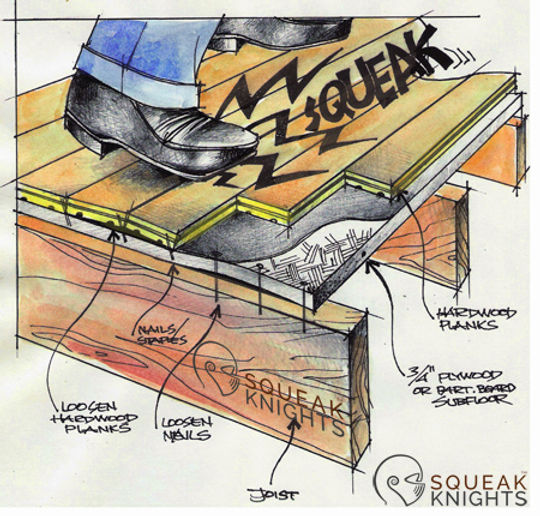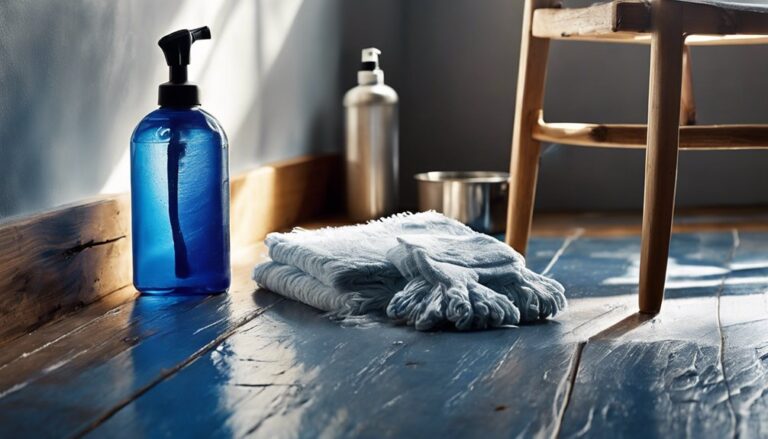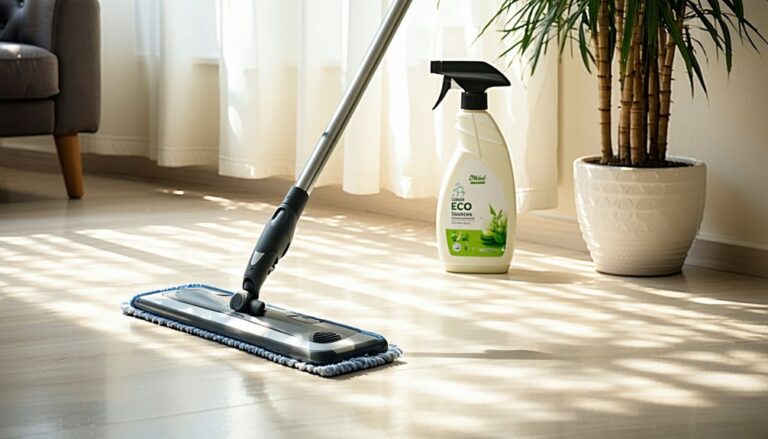Are those creaky floors driving you up the wall? Every step you take echoes through your home, like an uninvited guest that never leaves.
You’re not alone in this battle against the squeaks and groans beneath your feet. The good news is, you’re about to discover simple and effective ways to silence those noisy planks. Imagine walking through your home without that constant creaking announcing your every move.
In this guide, you’ll learn practical tips and tricks to stop your floors from creaking, allowing you to enjoy a peaceful and serene living space once again. Ready to reclaim your quiet? Let’s get started!

Causes Of Creaking Floors
Wood changes size with temperature. This causes floors to creak. In summer, wood expands. In winter, it shrinks. This movement can make noise. Gaps appear between boards. These gaps cause more creaking. Keeping a steady temperature helps. It reduces wood movement. This can help stop noise.
Floorboards may become loszittend over time. Walking on loose boards makes noise. Nails can come out, causing gaps. Fixing loose boards can stop creaks. Tighten the nails or screws. Ensure they are secure. Check for any damaged boards. Replace them if needed.
Floors need correct installation. Poor installation leads to noise. Gaps between boards cause creaks. Proper fitting of boards is important. Using quality materials helps. A professional can install floors correctly. This reduces future problems. It helps keep floors quiet and strong.
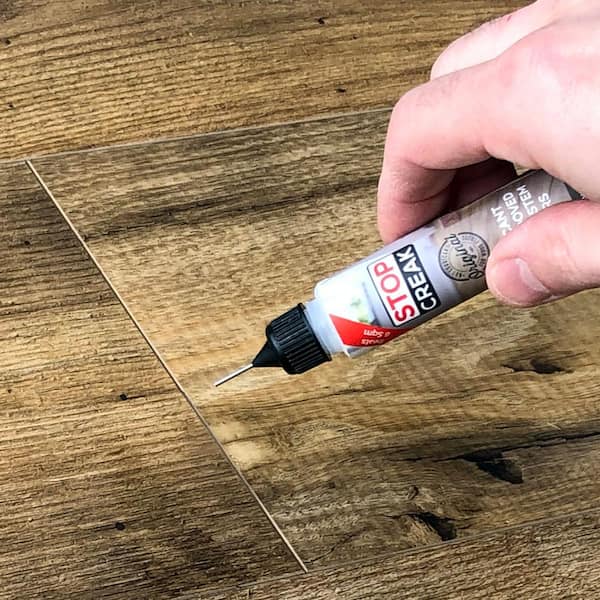
Simple Inspection Techniques
Floors creak due to loose boards or nails. Inspect for gaps and secure with screws or nails. Apply talcum powder or WD-40 for lubrication.
Identifying Loose Boards
Walk around your floor slowly. Feel for any loose boards. Loose boards will move when you step on them. Mark these boards with chalk or tape. This helps you remember where they are.
Checking For Moisture Issues
Look for any water stains on the floor. These can cause boards to warp. Warped boards make creaking sounds. Touch the floor to check for dampness. Dry floors are less likely to creak.
Listening For Problem Areas
Step quietly across the floor. Listen for creaking sounds. Pay attention to where the noise comes from. These areas need fixing. Use a notepad to jot down the noisy spots.
Diy Fixes For Creaky Floors
Sprinkle baby powder of cornstarch on the creaky spot. These powders can help stop the noise. They slip into the cracks and quiet the floor. Gently step on the floor to let the powder spread. Wipe away any extra powder. The floor should creak less now. If not, add more powder.
Loose nails can make floors creak. Use a hamer to tap them back in. Be gentle to avoid damage. Nail sets can push nails deeper. This helps them stay in place. Check other nails around the creaky spot. Tighten any that are loose. This simple fix can reduce noise.
Gebruik screws to make floors sturdy. Find the spot where the floor creaks. Drill a small hole into the floorboard. Insert a screw to hold it tight. Countersink the screw to avoid tripping. Use screws near creaky areas for more support. This helps keep the floor quiet.
Professional Repair Solutions
Floors creak for many reasons. Wood can shrink and swell. Nails may loosen over time. Calling a professional helps fix these issues. Experts know the best methods. They use special tools. Their work lasts longer. DIY fixes might not solve the problem. Professionals ensure safety and quality.
When To Call A Professional
Some creaks are minor. Others need urgent help. If floors squeak often, call an expert. Water damage needs immediate care. Old homes may have more issues. Professionals check the whole floor. They find hidden problems. They make sure repairs are thorough. This prevents future issues.
Expected Costs And Benefits
Costs vary based on the problem. Professionele diensten can be pricey. But they offer value. Repairs last longer. Floors become more sturdy. You save money in the long run. DIY fixes might seem cheaper. They might not fix deep issues. Investing in experts pays off.
Long-term Solutions
Professionals offer lasting fixes. They strengthen floor structures. They use quality materials. This prevents future creaks. Regular check-ups keep floors in good shape. Maintenance is key. Experts provide advice on care. Their solutions improve floor life. Your home stays quiet and safe.
Preventieve maatregelen
Floors often creak due to changes in humidity. Keep the room’s humidity level around 40-60%. Use a humidifier in winter. It adds moisture to dry air. In summer, use a luchtontvochtiger. It removes excess moisture. This keeps the floorboards from swelling or shrinking.
Sweep and mop floors often. Dust and dirt can cause creaks. Check for loose boards or nails. Tighten them when needed. A simple solution is to add lubricant. A little oil can reduce noise. It also helps the boards slide without sound.
High-quality materials last longer. They are less likely to creak. Choose hardwood for durability. Avoid cheap materials. They may warp or crack easily. Investing in good vloeren pays off. It reduces creaking and adds value to your home.
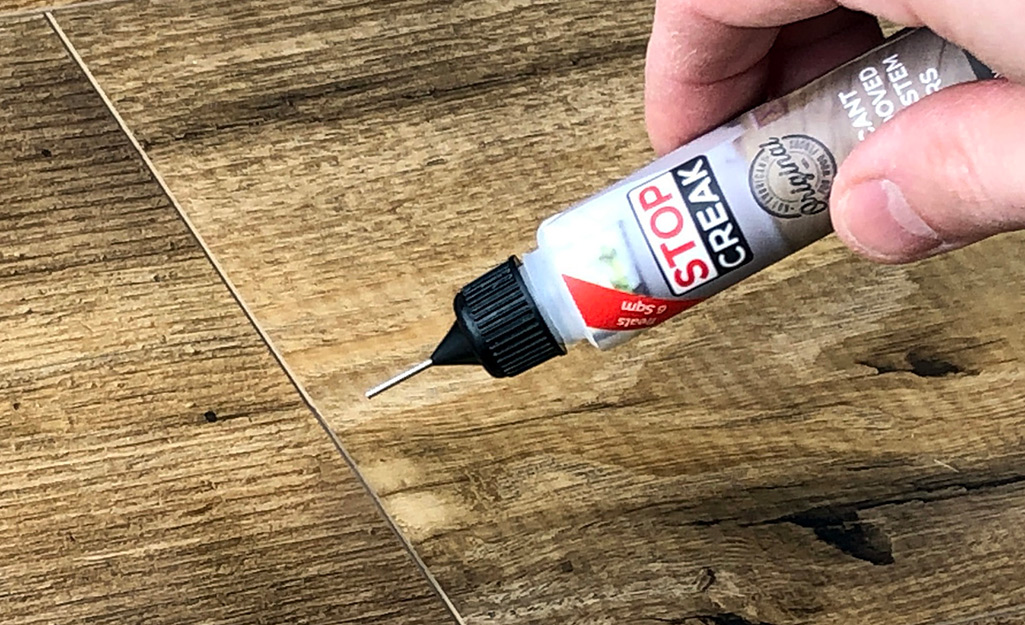
Pros And Cons Of Different Solutions
Some solutions are cheap, like using baby powder. Others cost more, like hiring a professional. DIY options save money. But results can vary. Special tools might be needed. They add to costs. Always plan your budget well.
Nails and screws can last for years. Yet, they might need fixing over time. Glue and adhesives also last long. But they might not hold heavy loads. Professionele diensten often provide the best durability. They might be costly.
Some methods are easy, like using baby powder. Others need tools and skills. Hiring professionals can be easy for you. But it costs more. Glue En adhesives need careful application. Always follow instructions closely. Safety is important.
Veelgestelde vragen
What Causes Floors To Creak?
Floors creak due to loose floorboards, shifting subfloor, or temperature changes. Wood expands and contracts, causing friction. Nails or screws might loosen over time, exacerbating the issue. Identifying the root cause helps determine the best solution for creaky floors.
Can Floor Creaking Be Fixed Permanently?
Yes, floor creaking can be fixed permanently. Solutions include securing loose boards, reinforcing the subfloor, or using specialized products. Regular maintenance and addressing structural issues promptly can prevent recurrence. Consulting a professional ensures long-lasting results.
Do Carpets Help Reduce Floor Creaks?
Carpets can reduce floor creaks by cushioning footsteps. They absorb sound and minimize friction between floorboards. However, carpets don’t address underlying structural issues. For permanent solutions, focus on fixing loose boards and subfloor problems.
Are Creaky Floors A Sign Of Damage?
Creaky floors aren’t necessarily a sign of damage. They often result from normal wear and tear. However, persistent creaking might indicate structural issues. Regular inspections can help identify potential damage early. Addressing concerns promptly ensures floor longevity.
Conclusie
Fixing creaky floors doesn’t have to be complicated. Simple solutions can make a big difference. Identify the source of the creak first. Try tightening loose boards or applying lubricant. Sometimes, adding extra nails or screws helps. Rugs can also reduce noise instantly.
Professional help is available for stubborn creaks. Maintaining your floor regularly prevents future issues. Remember, a quiet floor improves your home’s comfort. Take action today and enjoy the peace.

